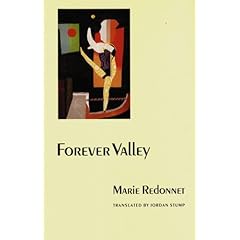HÔTEL SPLENDID by marie redonnet and SPLENDIDE-HÔTEL by gilbert sorrentino


these two take their title from the first poem of rimbaud’s ILLUMINATIONS [“And the Hôtel-Splendide was built in the chaos of ice and polar night.”]
HÔTEL SPLENDID is one of marie redonnet’s trilogy of death — the others are FOREVER VALLEY and ROSE MELLIE ROSE. i haven’t read the last, but like FOREVER VALLEY, HÔTEL SPLENDID is a thin book packed with modern anxiety in an oddly proto-modern setting. this time we’re in a rustic hotel set amidst a sucking, sulfuric swamp. less effective for me i think than FOREVER VALLEY (possibly because the hotel is a more familiar device and thus more in danger of being used as a cliche) HÔTEL SPLENDID was still impressive for its accumulative feeling of anxiety. its main character’s desperate attempt to keep up the rotting, leaking building as well as attend to her sisters ailments and hostilities, was perfect allegory for the burden of all our constant anxieties: bourgeois real estate phobias, hypochondria and contagion paranoia, and the melancholy in seeing the flesh’s various evidence of its encroaching age.
redonnet’s work is particularly virtuosic with time. time contracts and leaps in her writing. within a paragraph, between sentences, we can oddly jump weeks and then linger for pages on a single incident only to pass through a night in a phrase’s brief flourish. the effect is somewhat like reading an irregular diary — quickpenned and intense during moments of drama but languishing for long trials or spurted into with a feverish insight. and yet also her writing undercuts this diary-like inconsistency with its repeating, inescapable and unchanging obsessions. maybe a better comparison than diary is the fever dream, which moves forward in jumpcuts and then traps you in over-hot, looping nightmare scenes.
sorrentino’s SPLENDIDE-HÔTEL is a beautiful artwork of prose, constructed with just the slightest bits of conceit and image: the idea of rimbaud’s hotel and an alphabet primer (and maybe doc williams’ wheel barrow). from these he plays riffs on his favorite themes: the necessary artifice of literary work, our ceaseless acts of corruption, a paradoxically unsentimental nostalgia for mid-century america. i always thought SPLENDIDE-HÔTEL was ever-so-slightly marred by its occasional interluding poems which, even in his parodic modes, necessarily fall short in comparison to his dazzling sentences. nonetheless sorrentino delivers some of his best work here. the paragraphs are a wonder of shifting and connected precise perceptions; he’s enormously funny — a pitch black humor; and the sentences that have that old world panache so one can’t help but think: they don’t make them like that anymore…
here’s a bit:
B-b-b-b-b. The sound an idiot makes. I remember Jo-Jo, ah, a perfect idiot name. A Mongoloid, shuffling down the street on the arm of his grey and faded Irish mother, punching himself in the face. Yet we all stand now as idiots in the face of the mass devastation of feeling that abounds. A culture that can give no sustenance, and yet the remedies are for still more “useful skills.” Useful skills, and the heart dies, the imagination crippled so that mere boys are become mass murderers or drift blindly into a sterile adulthood. The young, the young! In a stupendous rage of nonbelief–faced with a spurious culture, the art that can give life sullied or made unavailable. What art there is is cheap and false, dedicated to a quick assay of the superficial. Don’t believe for a moment that art is a decoration or an emblem. It is what life there is left, though ill-used, ill-used. The young crying for nourishment, and they are given the cynical products of the most fickle market. “Look at what passes for the new,” the poet says. Put a handle on it and sell it, cotton candy: to be gone in a moment and leave no memory other than the memory of sickening sweetness (p. 9).
